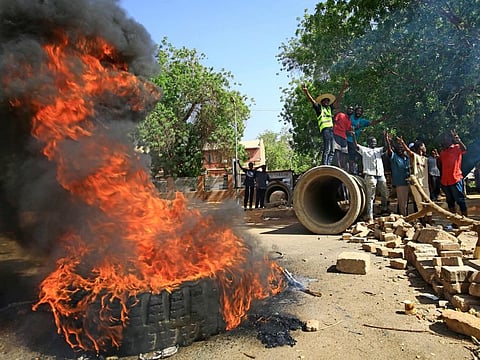6 dead as security agents attack Sudan sit-ins
Protesters, military council blame Al Bashir loyalists for violence

Khartoum - Sudanese protesters said Tuesday that security agents loyal to ousted President Omar Al Bashir attacked their sit-ins overnight, setting off clashes that left six people dead, including an army officer, and heightened tensions as the opposition holds talks with the ruling military council.
Both the protesters and the transitional military council said the violence was instigated by Al Bashir loyalists from within the security forces. Over the course of his 30-year rule, Al Bashir formed several paramilitary groups outside the regular army and police.
The violence erupted after nightfall on Monday, when protests in Sudan usually swell during Ramadan.
The Sudan Doctors Committee, which is part of the Sudanese Professionals Association that has been spearheading the protests since December, reported the six fatalities. The clashes took place in several locations across the country, including the main sit-in outside the military headquarters in the capital, Khartoum, the doctors union said.
Ahmad Rabie, a spokesman for the SPA, said more than 200 people were wounded. The ruling military council confirmed the death of an army major and said three troops were wounded.
The military removed Al Bashir from power on April 11 after four months of mass protests, in which security forces killed around 100 protesters and at least five soldiers who tried to protect the demonstrators.
On Monday, Sudanese prosecutors announced that they have charged Al Bashir with involvement in killing and incitement to kill protesters during the uprising, according to the state news agency SUNA. It was not immediately clear what punishment he might face.
Al Bashir, who was imprisoned in Khartoum days after his overthrow, is also wanted by the International Criminal Court on charges of war crimes and genocide linked to the Darfur conflict in the 2000s, but the military council has said it would not extradite him to The Hague.
In Khartoum, the clashes erupted as the protesters were expanding their sit-in area and setting up barricades made of burning tires and tree branches to block off major streets. The SPA said the road closures were in response to the military council’s delay in handing over power to civilians. It has called for another march on Tuesday, and protest leaders have threatened a general strike and civil disobedience.
Taka Ossman Isaac, a negotiator for the Forces for the Declaration of Freedom and Change, which represents the protesters, said late Monday that the negotiations were “fruitful.”
Rabie said negotiations would resume later Tuesday on the makeup of a transitional sovereign council, Cabinet and legislative body, and on the duration of the transition. The protesters have called for a four-year transition overseen by a civilian-led government, while the military council has said it would rule the country for up to two years until elections can be held.
Earlier Monday, before the clashes broke out, footage circulating online showed men from the Rapid Support Forces forcibly dispersing protesters. The paramilitary force, which has led counterinsurgency campaigns in Darfur and other regions, is led by Gen. Mohammad Hamdan Dagalo, the deputy head of the military council.
The RSF said that “anti-revolution groups” were behind the violence late Monday.
Gen. Abdul Fattah Burhan, the head of the military council, condemned the overnight violence, accusing unnamed “circles” of trying to “abort a deal” between the council and the opposition. Military chief Gen. Hashim Ahmad told reporters the military “did not fire a single bullet on the Sudanese people” during the overnight violence.


